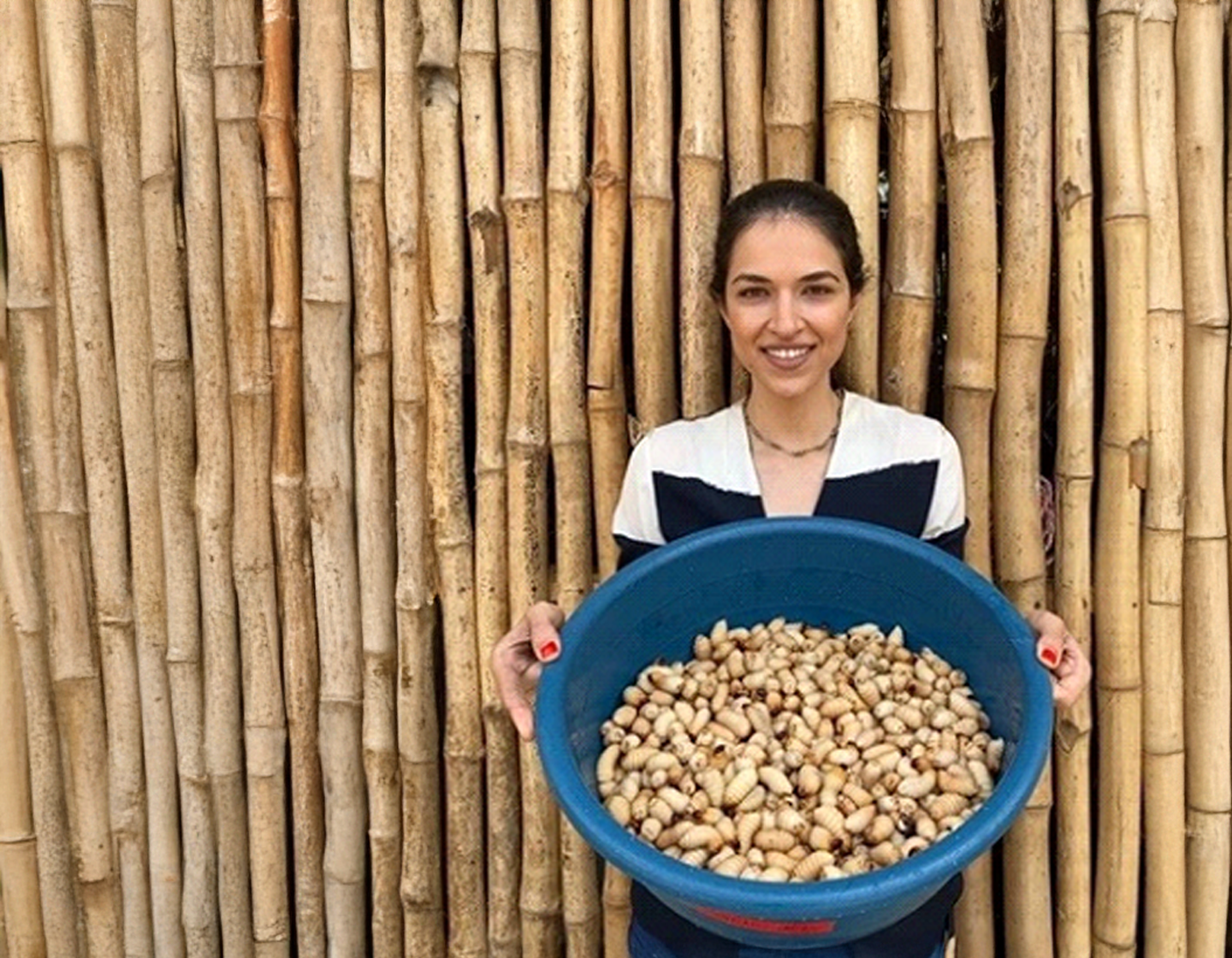At a glance
- Legendary Foods Africa aims to provide affordable, sustainable and nutritious protein through palm weevil larvae farming in West and Central Africa.
- Using innovative vertical farming, the company cultivates its larvae stock year-round with minimal environmental impact compared to traditional livestock farming.
- Legendary Foods Africa’s offering expanded from fresh and frozen larvae to shelf-stable products like larva-based chili sauce and cookies to overcome consumer resistance.
- The company is transitioning from direct-to-consumer to business-to-business sales, scaling production to meet the demands of larger businesses.
Legendary Foods Africa, a food-tech company founded in 2020 in Ghana by Canadian entrepreneur Shobhita Soor, farms, manufactures and sells palm weevil larvae products for human consumption. Protein demand is rapidly increasing across Africa, driven by population growth, urbanization and increased disposable income. However, the supply of animal protein remains scarce, meat itself is expensive and production methods are often unsustainable. As a result, protein deficiencies persist and related health risks are widespread. Legendary Foods Africa aims to address this crisis by offering a sustainable and affordable protein source through palm weevil larvae farming. Palm weevil larvae are rich in protein, healthy fats and essential nutrients such as zinc, B vitamins, iron, magnesium and calcium. Traditionally consumed across West and Central Africa, palm larvae provide a locally accepted and nutritionally dense alternative to meat and fish.
The broader issue
Although the UN aims to eradicate hunger by 2030, more than 600 million people are still projected to face hunger by the end of the decade unless global efforts are scaled significantly. The Sustainable Development Goals (SDGs) stress the increasing need to address climate change and global warming (SDG 13) and take decisive action to combat hunger (SDG 2) while focusing on sustainable agriculture and equitable food access. Meanwhile, consumption of animal-based protein has reached unprecedented levels – in 2020, consumers worldwide consumed nearly 75 kilograms of meat, fish, dairy and eggs per person – raising further concerns about the environmental impact and health consequences of such diets.
Alternative proteins – including plant-based options (e.g. soy, pea), microbial proteins and lab-grown meats – are considered promising substitutes for animal-based proteins. They offer the potential for healthier diets, reduced environmental impact and improved food security. Insects have been particularly highlighted as a natural, highly efficient source of protein that requires minimal resources, and the edible insect market continues to expand. Insect farming offers numerous advantages: insects are nutrient-dense, providing high levels of protein, omega-3 fatty acids and essential vitamins.
From an environmental perspective, insect farming generates significantly lower greenhouse gas emissions and uses less resources than traditional livestock. It is economically favorable, with low production costs and scalable farming methods. Insects also offer culinary versatility and a texture similar to animal protein, making them suitable for consumption in various forms – either whole or as an ingredient in processed foods.
Despite these benefits, insect farming faces several obstacles. Many populations have cultural prejudices and are reluctant to consume insects. As a new industry, insect farming competes with well-established, subsidized sectors like poultry and beef, as well as more familiar plant-based alternatives. Large investors and business-to-business (B2B) clients can be hesitant to invest in insect farming due to perceived risks related to the novelty of the products. Additionally, regulatory challenges persist, with incomplete legislation approving only selected insects for human consumption.
Palm larvae vertical farming
Legendary Foods Africa’s mission is to provide affordable, sustainable and nutritious protein to local populations of West and Central Africa. Soor explains her vision:
“I want to help create a future that is more environmentally, economically and socially responsible. That means creating a very local, scalable protein source that can become a great source of nutrition for people both locally and globally.” – Shobhita Soor
Traditionally, palm weevil larvae were harvested from the decomposing logs of felled or aging palm trees, where they thrived naturally. However, this foraging method was labor-intensive, seasonal and unsustainable. Based on proprietary rearing technology and scientific knowledge of the palm weevil life cycle, Legendary Foods Africa developed an innovative vertical farming factory to grow larvae year-round.
Years of trial and error in a pilot farm were needed to refine the process. Eventually, the company optimized feeding, temperature, humidity and breeding containers, resulting in efficient, high-quality production that 1) avoids deforestation and 2) requires less water, land and feed compared to beef. To further enhance sustainability, the company implemented a closed-loop system, repurposing farming byproducts as fertilizer for other agricultural supply chains.
“We are a food tech business in Ghana on a mission to deliver the nutrition of meat at the price point and sustainability of plants.”- Legendary Foods Africa: “Who we are”
Overcoming challenges
Soor encountered several challenges on her journey with Legendary Foods Africa.
Overcoming skepticism from the market
The company’s original product line included fresh and frozen larvae, traditionally consumed by the local population. Palm weevil larvae are often described as having a shrimp-like taste with the texture of sausage, and consumers use the larvae as direct substitutes for meat or fish in dishes like soups, stews and grilled skewers. However, the short three-day shelf life of fresh larvae represents a major barrier for exporting the product across countries. Additionally, limited appeal among younger, urban Ghanaians poses a challenge.
To address this, Soor decided to expand the company into processing as a way to sell value-added, shelf-stable products. The most popular item is the Shito sauce – a widely used mass market chili sauce. In 2023 the company launched larva-based cookies, positioned as a premium product. Because of their delicious taste, high protein content and nutritional benefits, the cookies were immediately successful. By 2024 the chili sauce accounted for about 70% of revenue, the cookies the remaining 30%, while sales of fresh or fried larvae – crispy, salted, spiced varieties – were insignificant.
Managing cultural differences
Ghana has one of the world’s highest rates of female entrepreneurship, particularly in trade, and Soor’s gender has not been as significant a barrier as one might expect. However, her age and origin posed greater challenges, with some business partners questioning her credibility as a young foreigner. Managing a local Ghanaian team with a different mindset taught Soor to balance her leadership style between being firm and remaining sensitive to the local business culture. She learned that Ghanaians tend to avoid confrontation, especially when addressing mistakes. Unlike in Western culture, where openly acknowledging errors is valued as a learning tool, mistakes in Ghana are often associated with shame, and handling them requires a more sensitive approach.
Did it work?
Five years after launch, the social enterprise has grown into a 70-person operation on the brink of profitability. Looking to the future, the company is considering various expansion plans:
Shifting from business-to-consumer to business-to-business: Food producers in West and Central Africa rely heavily on imported protein and therefore deal with economic pressures (currency fluctuations, rising import costs) that can affect both price and quality. This creates an opportunity for Legendary Foods Africa to supply a locally produced, affordable and high-quality protein alternative.
Geographic expansion: Legendary Foods Africa originally targeted West and Central African markets, where interest in palm larvae protein is strong, and demand potential is promising. However, the social enterprise has also identified opportunities beyond Africa. In Europe, investments in the alternative protein sector amounted to close to €800 million in 2023. North America has also embraced this shift, while consumer demand continues to grow across Asia – particularly in China and India – as the push for sustainable nutrition is reshaping dietary norms.
Takeaways
- Sustainable protein innovation rooted in local context: Legendary Foods Africa is addressing Africa’s growing protein demand by offering palm weevil larvae as a sustainable, nutritious and culturally accepted alternative to traditional meat, combining local food traditions with innovative farming technology.
- Cultural sensitivity plays a key role: Navigating local business culture, understanding communication styles and respecting customs are essential, especially for foreign entrepreneurs. Adaptability, seeking local expertise and fostering a supportive work culture can bridge cultural gaps and build trust.
- Pivoting product offerings can enhance market appeal: Expanding beyond fresh products to value-added, shelf-stable items can help overcome market skepticism, address shelf-life concerns and tap into mass-market demand.
- Scaling social enterprise: Repositioning in the B2B segment opens up other perspectives and enables the company to expand into new geographic regions, both within Africa and internationally.
This article is based on the IMD case IMD-7-2632 available from The Case Centre at http://www.thecasecentre.org












